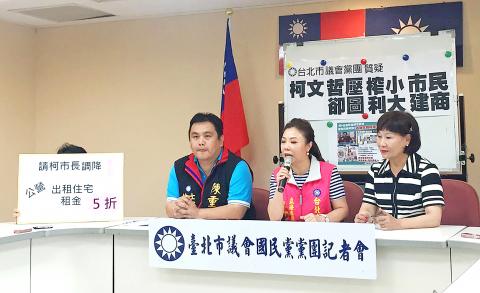A property tax cut proposed by the Taipei City Government yesterday came under fire from the Chinese Nationalist Party (KMT) Taipei City Council caucus, with city councilors saying that the policy is aimed at benefiting construction companies.
The city government earlier this month proposed a tax cut that would reduce property taxes paid by construction companies from 3.6 percent of the estimated value of a property to 2 percent for each house they are selling.
Under a draft bylaw, the tax rate would apply for one year after a property is put on the market, after which it would be raised back up to 3.6 percent.

Photo: CNA
The 2 percent rate is lower than that for residents holding two properties — 2.4 percent — and much lower than the rate stipulated for people with three or more properties — 3.6 percent.
At a news conference, KMT Taipei City Councilor Chen Chung-wen (陳重文) criticized the policy, saying that it created double standards for construction companies and Taipei residents.
He said that Taipei Mayor Ko Wen-je (柯文哲) during his election campaign last year repeatedly told Taipei residents that he would endeavor to uphold “residential justice” for young people who cannot afford to purchase a house and the policy belies that pledge.
“The policy panders to building companies, but exploits ordinary residents. Ko should apologize to the young people who voted for him,” Chen said.
KMT Taipei City Councilor Lee Yan-hsiu (李彥秀) said the policy came as a shock to most people given Ko’s campaign promises.
She also said that the tax cut would result in a reduction of about NT$100 million (US$3.04 million) in the city government’s revenue.
“Ko is always trying cut expenses to free up more capital for the city government — for example, canceling the discounts people get when transferring between buses and the MRT, collecting parking fees and canceling subsidies for senior citizens on Double Ninth Day (重陽節) — but by proposing a tax cut for construction companies, I think that he has failed to see the wood for the trees,” Lee said.
The KMT caucus said that it would attempt block the bylaw when it is delivered to the city council for review.
Ko earlier yesterday said the policy was “pragmatic.”
He said that construction companies would be subject to the 2 percent tax rate for one year so that their financial burden could be reduced as they try to sell their stock of houses.
“Under the draft bylaw, the rate would be applied for one year. Some think that is too long. This can be discussed at the council,” Ko said.
He said that the property rates were originally introduced to deter people from stockpiling houses, but that he has discovered that state-run enterprises that want to purchase properties and rent them out to their employees are also required to pay the 3.6 percent tax rate, which he said is unfair.

SECURITY: As China is ‘reshaping’ Hong Kong’s population, Taiwan must raise the eligibility threshold for applications from Hong Kongers, Chiu Chui-cheng said When Hong Kong and Macau citizens apply for residency in Taiwan, it would be under a new category that includes a “national security observation period,” Mainland Affairs Council (MAC) Minister Chiu Chui-cheng (邱垂正) said yesterday. President William Lai (賴清德) on March 13 announced 17 strategies to counter China’s aggression toward Taiwan, including incorporating national security considerations into the review process for residency applications from Hong Kong and Macau citizens. The situation in Hong Kong is constantly changing, Chiu said to media yesterday on the sidelines of the Taipei Technology Run hosted by the Taipei Neihu Technology Park Development Association. With

CARROT AND STICK: While unrelenting in its military threats, China attracted nearly 40,000 Taiwanese to over 400 business events last year Nearly 40,000 Taiwanese last year joined industry events in China, such as conferences and trade fairs, supported by the Chinese government, a study showed yesterday, as Beijing ramps up a charm offensive toward Taipei alongside military pressure. China has long taken a carrot-and-stick approach to Taiwan, threatening it with the prospect of military action while reaching out to those it believes are amenable to Beijing’s point of view. Taiwanese security officials are wary of what they see as Beijing’s influence campaigns to sway public opinion after Taipei and Beijing gradually resumed travel links halted by the COVID-19 pandemic, but the scale of

A US Marine Corps regiment equipped with Naval Strike Missiles (NSM) is set to participate in the upcoming Balikatan 25 exercise in the Luzon Strait, marking the system’s first-ever deployment in the Philippines. US and Philippine officials have separately confirmed that the Navy Marine Expeditionary Ship Interdiction System (NMESIS) — the mobile launch platform for the Naval Strike Missile — would take part in the joint exercise. The missiles are being deployed to “a strategic first island chain chokepoint” in the waters between Taiwan proper and the Philippines, US-based Naval News reported. “The Luzon Strait and Bashi Channel represent a critical access

Pope Francis is be laid to rest on Saturday after lying in state for three days in St Peter’s Basilica, where the faithful are expected to flock to pay their respects to history’s first Latin American pontiff. The cardinals met yesterday in the Vatican’s synod hall to chart the next steps before a conclave begins to choose Francis’ successor, as condolences poured in from around the world. According to current norms, the conclave must begin between May 5 and 10. The cardinals set the funeral for Saturday at 10am in St Peter’s Square, to be celebrated by the dean of the College